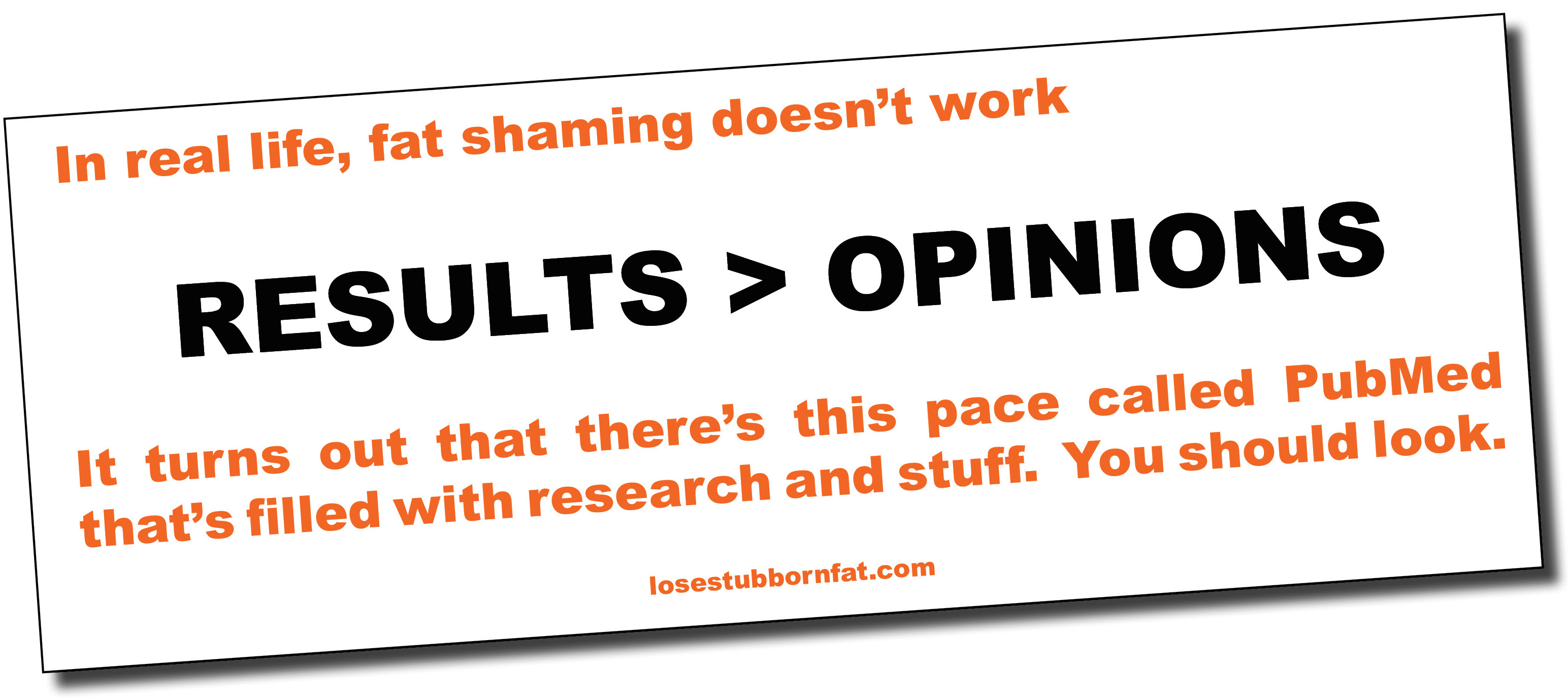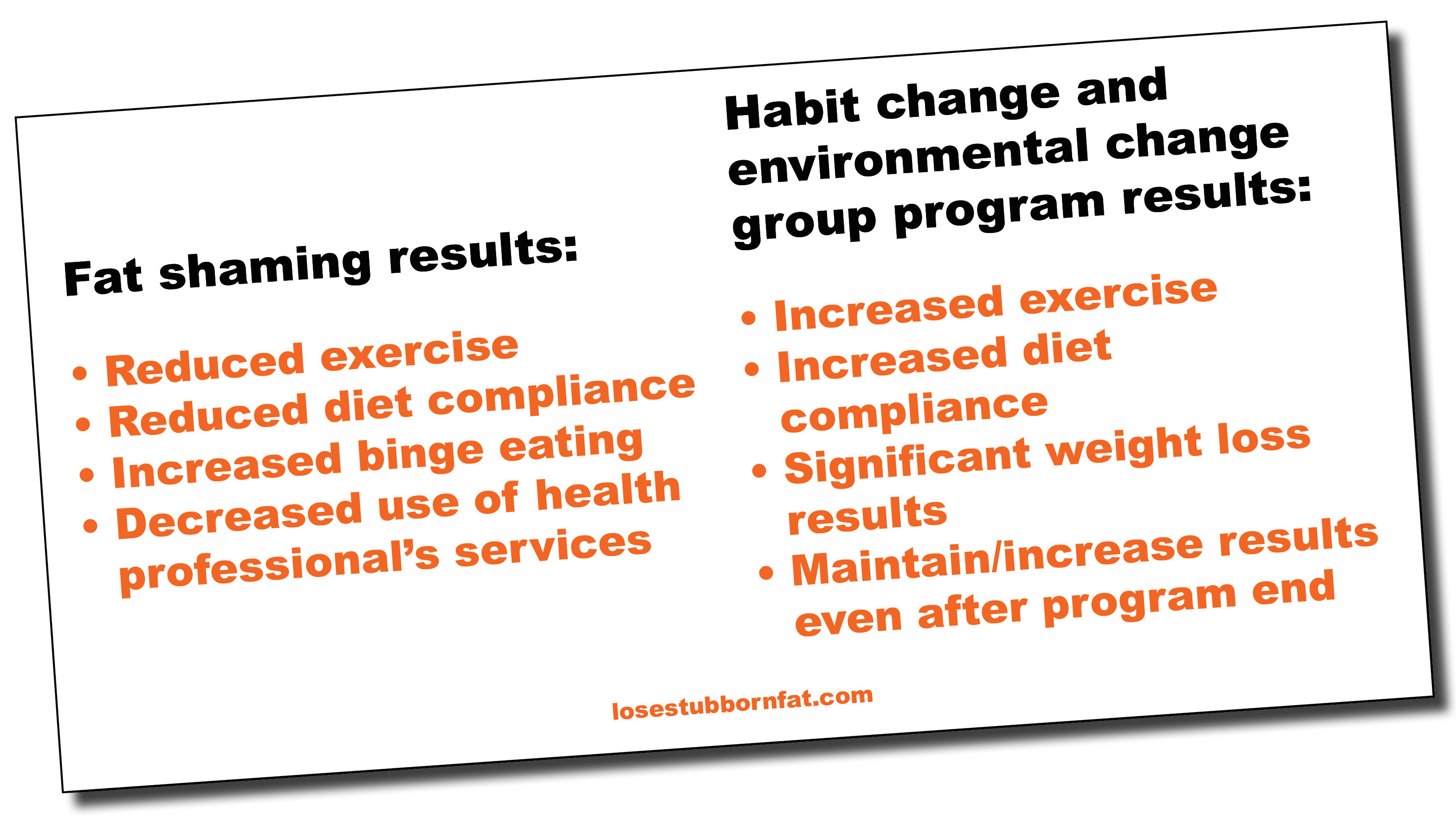Nothing pisses me off more than people — personal trainers even — that think that fat shaming can be effective.
When I get in fights with them on Facebook, they act as if fat shaming being effective is a matter of opinion. Like, we can discuss it’s merits, and because they have an opinion, I’m supposed to humor them.
Believing fat shaming is effective
is on par with believing the world is flat
If this were a few hundred years ago, people would think your opinion was valid. But we have evidence now that would argue against both.
The Results that Fat Shaming Produces
Research indicates that fat shaming results in:
- Reduced exercise
- Reduced diet compliance
- Increased binge eating
- Decreased use of health professional’s services
Wow — that’s pretty much the opposite of everything we want. Good job fat shamers, we know that what you’re doing is making the problem worse.
There’s a great paper by Rebecca Puhl, PhD and Christopher Wharton, PhD:
Weight Bias: A Primer for the Fitness Industry
In fact, Rebecca Puhl has done a ton of amazing research on the effects of weight bias (which is the clinical term for fat shaming). The above link is an awesome summary of her research as it relates to fitness professionals.
So I think it’s silly that I end up in arguments with people who have literally zero training in psychology or working with obese patents/clients, who think that their opinion is valid. Consider the paper above was written by someone who is:
- Deputy Director for the Rudd Center for Food Policy & Obesity and Professor in Residence in the Department of Human Development and Family Studies at UConn.
- Ph.D. in Clinical Psychology from Yale University. She has
- Conducted research on weight bias for 15 years and has published numerous studies on weight-based bullying in youth, weight bias in health care and the media, interventions to reduce weight bias, and the impact of weight stigma on emotional and physical health.
- Testified in state legislative hearings on weight bias,
- Routinely provides expertise to state and national health organizations
- Has developed evidence-based training programs to reduce weight bias that have been implemented in medical facilities across the country.
- Leading national expert in the field of weight bias, and her research is routinely publicized in national and international media.
- Served on the Council of The Obesity Society and the Board of Directors for the Obesity Action Coalition
- Awards include the Excellence in Policy Research Award from the National Eating Disorders Coalition.
It might seem silly to post her whole bio here.
I just really wanted to emphasize, for the people who argue so passionately for fat shaming, that there’s a difference between having an opinion and a belief about something, and having given your life to researching it.
The People Who Think Fat Shaming Works
The number one thing that everyone who thinks fat shaming works has in common:
They don’t work with overweight or obese clients.
It’s easy for them to sit on their high horse and pull completely ignorant opinions out of their ass because it actually doesn’t matter for them. They have no experience producing results for overweight or obese clients, and they actually have no reason to get education about producing results for overweight or obese clients.
What Actually Works
First off, in general, behavioral weight loss programs produce an 8-9% reduction in weight over six months. What that means is that group programs that just focus on habits are already proven effective.
Let me repeat: We already have an evidence base for what’s effective for weight loss… and it never includes fat shaming. It includes habits and group support.
Here’s that awesome randomized controlled trail. And for those that don’t research, a randomized controlled trial is considered the gold standard:
A randomized trial comparing two approaches to weight loss: Differences in weight loss maintenance
So that above link is for that awesome randomized controlled trial, by a bunch of really smart people who are clinical psychology researchers: Robert A Carels, PhD, Jacob M Burmeister, PhD, Afton M Koball, PhD, , Marissa W Oehlhof, PhD, Nova Hinman, doctoral candidate, Michelle LeRoy, PhD, Erin Bannon, doctoral candidate, Lee Ashrafioun, PhD, Amy Storfer-Isser, PhD, Lynn A Darby, PhD, and Amanda Gumble, PhD.
Again, I just want to highight that this trial was done by phoneomenally educated people who’ve devoted their lives to researching behavior change.
The study compares two behavior modification programs for weight loss. What’s cool is that they’re actually both effective during the intervention — clients lost weight on both of them.
One of them, the clients continued to lose weight, even after the trial. Lets take a look at the methods used in that program (Transform Your Life):
- Developing and maintaining healthy habits
- Disrupting unhealthy habits
- Creating a food environment that increases exposure to healthy eating
- Creating an exercise environment that increases exposure to physical activity
In both programs in the study, the participants lost 14.6 pounds in 12 weeks. Which is pretty awesome. In the one that was habit/environment based, they also lost another 4.8 pounds in the six months after working with the program.
We have actual research, with amazingly effective programs that are all based on similar principles…
…and none of them include fat shaming.
Fat Shaming vs. Habits
Ok, lets compare the evidence:
Fat shaming results:
- Reduced exercise
- Reduced diet compliance
- Increased binge eating
- Decreased use of health professional’s services
Habits/environment group program results:
- Increased exercise
- Increased diet compliance
- Significant weight loss results
- Maintain/increase results even after program
Positive, Action Based Programs Work
It should be super obvious at this point, shaming people is stupid and ignorant. Besides the fact that it also reduces my faith in humanity, lets get to brass tacks — fat shaming just isn’t effective. Fat shaming produces negative results.
On the flip-side, a positive, action based (habits, environmental change) program produces results in the real world. Again, forget the fact that it’s a more human, less paternalistic approach — it just produces better results.
Results > Opinions
Lets stop yelling at people and making them feel bad, and lets start working on changing habits and giving them group support.
by Josh Hillis
Author: Fat Loss Happens on Monday


Leave a Reply